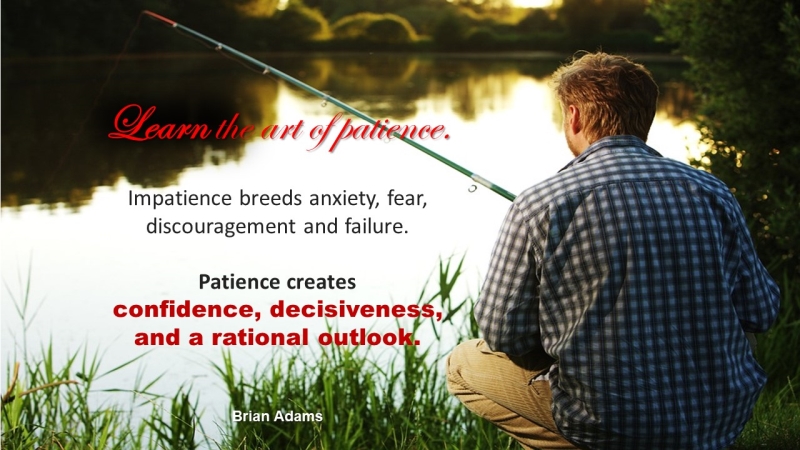HAVE YOU EVER BEEN CLOSE TO COMPLETING A TASK WHEN YOUR IMPATIENCE STOOD IN THE WAY? We’ve all been there. Impatience can breed anxiety, fear, discouragement, and failure. However, patience can create confidence, decisiveness, and a rational outlook, eventually leading to success. In this article, we’ll discuss why patience is the most critical quality for success.
The Power of Patience
One quality that is frequently overlooked is patience. Still, it is one of the essential qualities you can possess. Here are some of the reasons why patience is so powerful:
- Patience helps you stay calm and composed even when faced with challenging situations.
- Patience allows you to think clearly and rationally, making it easier for you to make good decisions.
- Patience helps you build resilience, which is essential in achieving long-term success.
- Patience lets you stay focused on your goals and avoid being distracted by short-term setbacks.
- Patience helps you build better relationships with others, as you are less likely to overreact or become defensive.
How Impatience Can Lead to Failure
Impatience is the enemy of success. When you are impatient, you are more likely to make hasty decisions, take unnecessary risks, and become discouraged when things don’t go as planned. Here are some of the ways that impatience can lead to failure:
- Impatience can cause you to rush into decisions without fully considering the consequences.
- Impatience can make you take shortcuts that may compromise the quality of your work.
- Impatience can cause you to become frustrated and give up when things don’t go as planned.
- Impatience can cause you to focus on short-term gains rather than long-term success.
How Patience Leads to Success
On the other hand, patience is the key to achieving success.
- Patience helps you stay focused on your goals, even when progress is slow.
- Patience helps you take the time to make good decisions that will benefit you in the long run.
- Patience helps you stay calm and composed, even when faced with challenges or setbacks.
- Patience helps you build resilience, which is essential in achieving long-term success.
How to Cultivate Patience
Cultivating patience is not easy, but it is essential to achieve success. Here are some pointers for increasing your patience:
- Practice mindfulness: The practice of mindfulness involves being fully aware of your thoughts and emotions while in the present. You can learn to spot when you are getting impatient and take action to calm yourself down by engaging in mindfulness practices.
- Practice empathy: Empathy is the capacity to comprehend and experience others’ emotions. By practicing empathy, you can learn to be more patient with others, which will help you be more patient with yourself.
- Practice gratitude: Gratitude is being thankful for what you have. By practicing gratitude, you can learn to appreciate the present moment and be more patient with achieving your goals.
- Set realistic goals: Setting realistic goals that are achievable within a reasonable timeframe can help you stay patient and motivated.
- Exercise self-compassion: When you are hard on yourself or beat yourself up for mistakes, it can lead to feelings of impatience and frustration. Practicing self-compassion can help you be more patient with yourself and others. Treat yourself with kindness and understanding, just like a close friend.
The Benefits of Patience
The benefits of patience are numerous and extend beyond just achieving success. The following are some advantages of developing patience:
- Better decision-making: Patience helps you take the time to make good decisions that will benefit you in the long run.
- Improved relationships: Patience helps you build better relationships with others, as you are less likely to overreact or become defensive.
- Increased happiness: Practicing patience can increase happiness by helping you find joy in the present moment, letting go of negative emotions, and improving your overall well-being.
- Improved health: Patience can reduce stress and anxiety, improving your physical health.
- Greater resilience: Patience helps you build resilience, essential in achieving long-term success and overcoming obstacles.
- Greater self-control: Patience helps you exercise self-control, improving your self-discipline and leading to tremendous success in all areas of your life.
How Patience Leads to Increased Happiness
Patience can also lead to increased happiness. When you are patient, you can enjoy the present moment and find joy in the journey toward your goals rather than solely focusing on the outcome. This can help you feel more fulfilled and content, leading to greater happiness.
When constantly focused on the future and anxious about achieving your goals, you may miss the positive experiences and opportunities right before you. Additionally, impatience can lead to negative emotions like anger, frustration, and disappointment. By cultivating patience, you can learn to let go of negative emotions and enjoy the present moment, leading to greater happiness and life satisfaction.
Research has also shown that practicing patience can lead to greater well-being and lower stress and anxiety levels. People who reported being more patient also reported higher levels of life satisfaction, better mental health, and lower levels of stress and negative emotions, according to the Journal of Positive Psychology. They also rated their life satisfaction as higher.
In summary, practicing patience can increase happiness by helping you find joy in the present moment, letting go of negative emotions, and improving your overall well-being. So, if you want to lead a happier and more fulfilling life, cultivate patience and enjoy the journey toward your goals.
Examples of Patience Leading to Success
Many successful individuals have attributed their success to patience. Here are some examples of how patience has helped people achieve their goals:
- Elon Musk, the CEO of Tesla and SpaceX, has said that his patience and long-term thinking have been critical to his success. Musk had invested billions of dollars into his companies over the years, even when they were not profitable, believing they would eventually become successful.
- J.K. Rowling, the author of the Harry Potter series, was rejected by numerous publishers before finally finding one to publish her book. Rowling has said that her patience and persistence were essential to success.
- Walt Disney faced many setbacks and failures before finally achieving success with Disneyland. Disney was patient and persistent, and his vision eventually became a reality.
Overcoming Impatience
It’s easy to lose patience, even momentarily, when things don’t go as planned. Here are some tips for overcoming impatience:
- Take a break: If you grow impatient or frustrated, it’s best to remove yourself from the situation for a while. This can help you clear your mind and regain a sense of perspective.
- Practice gratitude: Focusing on what you are grateful for can help shift your mindset from impatience and frustration to positivity and contentment.
- Practice perspective-taking: Try putting yourself in the shoes of others to gain a different perspective on the situation. This can help you see things from a new angle and develop greater empathy and patience.
The Downside of Impatience
While impatience may sometimes seem necessary for success, it can also have negative consequences. Here are some of the downsides of impatience:
- Increased stress and anxiety: Take a break and leave the situation if you feel impatient or frustrated. This can negatively impact your mental and physical health.
- Risk-taking behavior: When you are impatient, you may be more likely to take unnecessary risks or make hasty decisions. This can lead to negative consequences and setbacks in pursuing your goals.
- Strained relationships: Impatience can also strain your relationships with others, causing you to become irritable, demanding, or critical.
By understanding the downsides of impatience and the benefits of patience, you can cultivate more remarkable patience in your life and enjoy tremendous success and well-being as a result.
Conclusion
Patience is the ultimate virtue in the pursuit of success. It can assist you in maintaining composure, thinking clearly and logically, developing resilience, and concentrating on your objectives. On the other hand, Impatience can lead to failure by causing you to make hasty decisions, take unnecessary risks, and become discouraged when things don’t go as planned.
Cultivating patience is not easy, but it is essential to achieve success. By practicing mindfulness, empathy, and gratitude, setting realistic goals, and exercising self-control, you can learn to be more patient and achieve tremendous success in all areas of your life.
So, the next time you feel impatient, take a deep breath and remember that patience is the ultimate virtue in pursuing success. Success is a process, not an endpoint. Patience will help you enjoy the journey and achieve success in the long run.
CLICK THE IMAGE TO LEARN MORE




